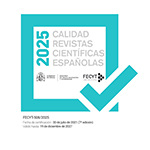Identities stolen. Art, appropriation and extimacy in life online
Abstract
Not only have social networks radically transformed the personal experiences of privacy and intimacy, but also have fostered new spaces to analyze socialization strategies, thus becoming a priority experimentation territory for artists working on creative proposals focused on identity and on the preservation of privacy and intimacy. Their extreme expositions reveal a persistent need to reaffirm self-esteem that is paradoxically opposed to the exercise of effective control over our visibility and over the use of personal images in social media. The objective of this research is to critically examine, through works of artists, how social media users manage their shared identity. Likewise, the goal is to find out how they react when they are robbed of intimate images, or when they discover them exposed in private galleries and online exhibitions. The violation of privacy that both individuals and big companies running social media companies execute when they use private user information is confronted with the personal and free decisions of users when they want to share their privacy and intimacy; thefts and donations coexist in the same territory of connected life.
Downloads
Article download
License
In order to support the global exchange of knowledge, the journal Arte, Individuo y Sociedad is allowing unrestricted access to its content as from its publication in this electronic edition, and as such it is an open-access journal. The originals published in this journal are the property of the Complutense University of Madrid and any reproduction thereof in full or in part must cite the source. All content is distributed under a Creative Commons Attribution 4.0 use and distribution licence (CC BY 4.0). This circumstance must be expressly stated in these terms where necessary. You can view the summary and the complete legal text of the licence.










